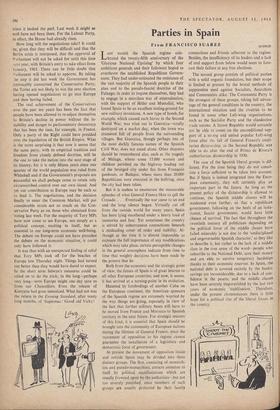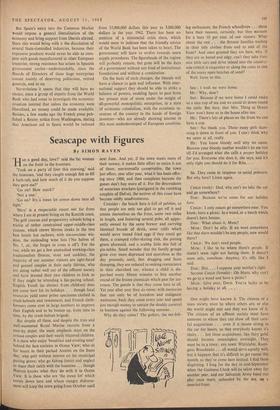Parties in Spain
LAST month the Spanish regime cele- brated the twenty-fifth anniversary of the `Glorious National Uprising' by which four ambitious generals, and their followers hoped to overthrow the established Republican Govern- ment. They had under-estimated the resistance of the vast majority of the Spanish people to their plan and to the pseudo-fascist doctrine of the Falange; in order to impose themselves, they had to engage in a merciless war of extermination, with the support of Hitler and Mussolini, who found Spain to be an excellent testing-ground for new military inventions. A new type of bomb, for example, which caused such havoc in the Second World War, was tried out in Guernica---totally destroyed on a market day, when the town was crammed full of people from the surrounding villages. But Guernica, though perhaps one of the most darkly famous names of the Spanish Civil War, does not stand alone. Other disasters should be remembered also, such as the tragedy of Malaga, where some 15,000 women and children perished on the highway leading out of the besieged city under fire from Franquist gunboats, or Badajoz, where more than 20,000 Republicans were executed in the bullring, once the city had been taken.
But it is useless to enumerate the memorable episodes of what General Franco likes to call the Crusade. . . . Eventually the war came to an end and the long silence began. Virtually cut off from the outside world for many years, Spain has been lying smothered under a heavy load of memories and fear. Yet sometimes the country is stirred by subterranean commotions beneath a misleading cover of order and stability. Al- though at the time it is almost impossible to estimate the full importance of any modifications which may take place, certain perceptible changes in the general atmosphere indicate from time to time that weighty decisions have been made by the powers that be.
Both from the economic and the strategic point of view, the future of Spain is of great interest to all other European countries; and now, it seems, it has arrived at a turning-point in its evolution.
Haunted by forebodings of another Cuba on the European continent, the American sponsors of the Spanish regime arc extremely worried by the way things are going, especially in view of the fact that further military bases will have to be moved from France and Morocco to Spanish territory in the near future. For strategic reasons of this kind, it is essential that Spain should be brought into the community of European nations during the lifetime of General Franco, since the movement of opposition to his regime cannot guarantee the installation of a legitimate and democratic form of government.
At present the movement of opposition inside and outside Spain may be divided into three distinct groups. The first, consisting of monarch- ists and pseudo-monarchists, attracts attention to itself by political manifestations which are usually frowned upon by the authorities—but not too severely punished, since members of such groups are usually protected by their family connections and friends adherent to the regime. Besides, the insufficiency of its leaders and a lack of real support from below would seem to fore- cast their failure at any free elections.
The second group cpnsists of political parties with a solid organic foundation, but their scope is limited at present by the brutal methods of suppression used against Socialists, Anarchists and Communists alike. The Communist Party is the strongest of these groups, taking full advan- tage of the general conditions in the country, the international situation and the rivalries to be found in some other Left-wing organisations, such as the Socialist Party and the clandestine trade unions. A future Republic would certainly not be able to count on the unconditional sup- port of a strong and united popular Left-wing force after the fall of General Franco's totali- tarian dictatorship, as the Second Republic was able to do after the end of Primo de Rivera's authoritarian dictatorship in 1930.
The case of the Spanish liberal groups is dif- ferent. For the time being they do not consti- tute a force sufficient to be taken into account. But if Spain is indeed integrated into the Euro- pean community, they will certainly play an important part in the future. As long as the present policy of the dictatorship is allowed to continue, the Spanish middle classes will be weakened even further, so that a republican government, following on the heels of an isola- tionist, fascist government, would have little chance of survival. The fact that throughout the twentieth century all politicians depending on the political force of the middle classes have failed miserably is not due to the 'undisciplined and ungovernable Spanish character,' as they like to describe it, but rather to the lack of a middle class in the true sense of the word—people who subscribe to the National Debt, save their money and are able to survive temporary hardships thanks to their economic reserves. In Spain, the national debt is covered entirely by the banks; savings are inconsiderable, due to a lack of con- fidence in the peseta; and the middle classes have been severely impoverished by the last two years of economic 'stabilisation.' Therefore, under the present circumstances there is little hope for a political rise of the liberal forces in the country. But Spain's entry into the Common Market would impose a general liberalisation of the economy and bring support from liberals abroad. Since this would bring with it the dissolution of several State-controlled industries, because their expensive products would never be able to com- pete with goods manufactured in other European countries, strong resistance has arisen in Spanish government circles—understandably, since the Boards of Directors of these huge enterprises consist mainly of deserving politicians, retired generals, and so on.
Nevertheless it seems that they will have no choice, since a group of experts from the World Bank who had come to investigate the economic situation insisted that unless the economy were liberalised, no money could be made available. Besides, a few weeks ago the French press pub- lished a Reuter notice from Washington, stating that American aid to Spain would be reduced from 35,000,000 dollars this year to 5,000,000 dollars in the year 1962. There has been no mention of a ministerial crisis since, which would seem to indicate that the friendly advice of the World Bank has been taken to heart. The government will have to evolve towards more supple procedures. The figureheads of the regime will probably remain, but gone will be the days of a government without any kind of institutional foundations and without a constitution.
On the basis of such changes, the liberals will have a chance to gain real influence. With inter- national support they should be able to strike a balance of powers, enabling Spain to pass from her present state of stress under the weight of all-powerful monopolistic enterprises, to a state of economic colonialism, with the economic re- sources of the country in the hands of foreign investors—who are already showing interest in this most underdeveloped of European countries.































 Previous page
Previous page